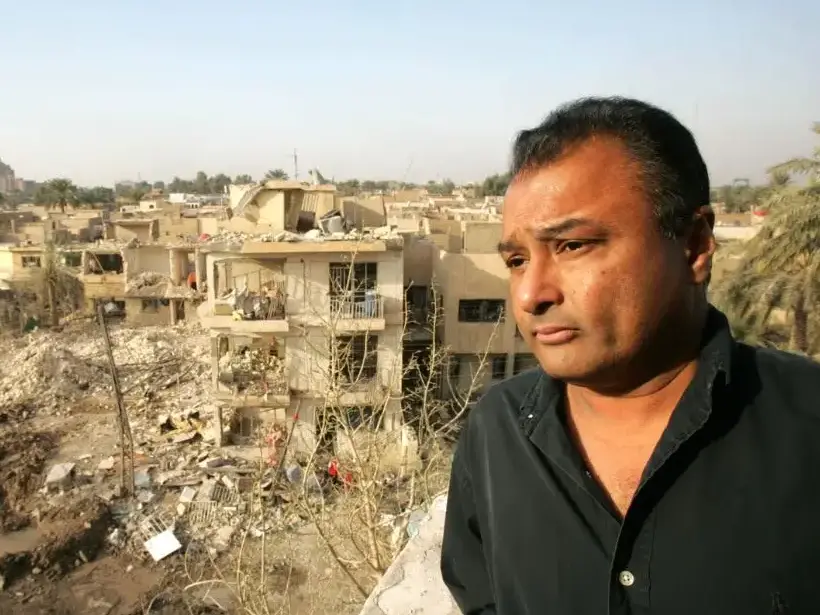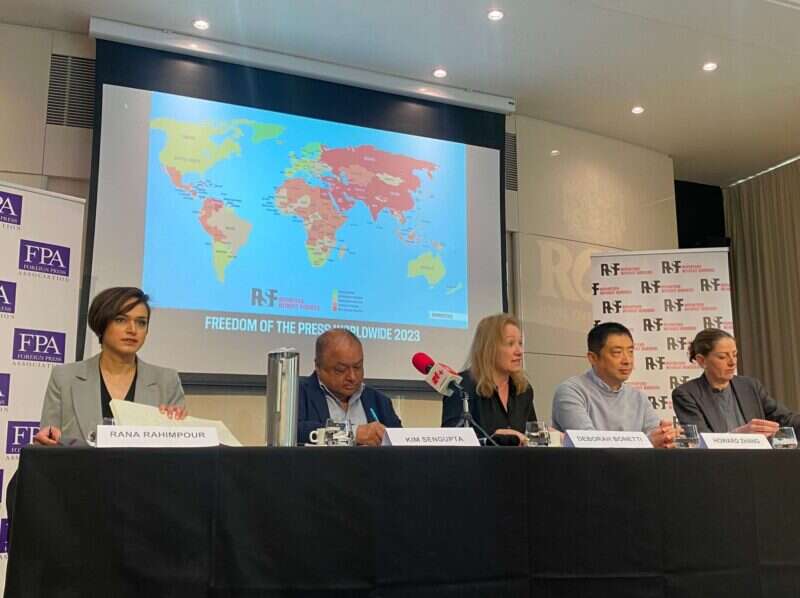
The Independent’s veteran war correspondent Kim Sengupta has died suddenly aged 68 in a “devastating loss” for the news title.
Sengupta had worked at The Independent since 1996 as defence and diplomatic correspondent and editor, covering every major conflict of the past 30 years. The newsbrand announced his death on Tuesday.
The Independent’s editor-in-chief, Geordie Greig, said: “The sudden death of Kim Sengupta is a devastating loss for The Independent as well as for the wider world of journalism. Kim was a reporter’s reporter. He lived for the story and courageously covered countless conflicts from Iraq to Ukraine.
“I first knew him more 40 years ago when he was a general reporter in Fleet Street and from those early days hugely admired his tenacious and tireless ambition to quest and pursue. He lived and worked ferociously hard, more often than not on the frontline, with a Hemingway swagger as he travelled the globe for The Independent.
“Modestly, he downplayed the dangers of war even as he told of the trials and tribulations of reporting with zest, humour and humanity.”
During his career, in which he also worked as a reporter for the Daily Mail and the now-defunct Today newspaper before he joined The Independent, Sengupta covered conflicts including in Afghanistan, Iraq, Syria, Libya, the Balkans, Ukraine, Georgia, Kosovo, Mali, Sudan, Somalia, Kashmir, Israel, Gaza and Northern Ireland.
In 2012 Sengupta wrote for Press Gazette about the difficulties of reporting from Syria with frequent power outages and even satellite transmission being blocked – resulting in a temperamental 3G dongle being his only option. “For the first time ever, bear in mind I’ve worked everywhere from Helmand to Haiti, you simply couldn’t make it work.”
He added: “On safety, there’s not an awful lot you can do, because a lot of the attacks are not targeted but random. It’s not as bad as Baghdad from 2004 to 2008, where you faced suicide bombings.
“The obvious thing to do was not hang to around with large numbers of rebel fighters for too long, not to stay in particular areas for too long and although the shelling and air strikes were random, there were certain times when they were less frequent than others and it was a case of using the time to maximise how much you can cover.”
Speaking on a Reporters Without Borders panel last year, Sengupta said reporting from Ukraine was “dangerous” for journalists but not as much as in Iraq in “the really bad days”.
“But the difference is it’s the first war that many of us have covered [in which] two relatively modern states” were fighting, he said.

Sengupta’s awards and credits include being named Journalist of the Year at the Asian Media Awards in 2016.
Afterwards he said of the industry: “It’s tough. Print journalism in particular is going through tremendous problems at the moment with falling circulation, falling advertising.
“But when I speak to students at universities and schools, there are extraordinary numbers that want to be journalists.
“I ask them in the current climate: ‘Why do they want to be journalists when they could be making more money in the city or doing law?’
“But they still have got this desire to explain what journalism is, to try and understand issues. It’s going to be tough but they will enjoy it.”
Among his other award recognitions, Sengupta was a finalist for Foreign Affairs Journalist of the Year at the British Journalism Awards 2013 and his reporting from Iran was referenced in the shortlisting of The Independent for News Provider of the Year at the same awards in 2020. He was also shortlisted for the London Press Club’s Print Journalist of the Year award in 2020/21 and racked up three nominations for the Orwell Prize for Journalism.
Sengupta also gave back, including by acting as part of the judging panel for Private Eye’s Paul Foot Award for Investigative and Campaigning Journalism as recently as this year.
His final bylines were less than a week before his death, with a comment piece headlined: “Has Netanyahu finally lost support in America?” published on Thursday.
Chris Blackhurst, former editor at The Independent, said: “In many years of working with Kim Sengupta I never came across anyone so fearless.
“As editor, you get to appreciate which journalists are ‘high maintenance’, constantly and painfully seeking approval and reassurance. Kim, despite the places he went, was most definitely not one of those. If he said he was going somewhere, he went there.
“He had an extraordinary knack for talking to anyone, be they ambassadors or generals or privates or those of an unspecified background – security services most probably – and extracting information from them. Kim really was one of a kind.”
Tributes to Kim Sengupta
Many journalists, including foreign correspondent and Independent colleagues, wrote tributes to Sengupta on Tuesday morning as news about his death broke. Here is a selection:
This is terrible news, just 68. Kim was a remarkable and intrepid correspondent. I don’t think anyone matched his score of around 30 embeds with British troops in Afghanistan. And he did so much more, notably in Syria. The ultimate quiet professional https://t.co/DGjVCCe8qQ
— Mark Urban (@MarkUrban01) July 30, 2024
We lost our colleague Kim Sengupta yesterday. An Indy stalwart with incredible contacts, experience and decades spent on the frontline. Would ask him to write for Voices on any breaker and get an immediate ‘👍’.
— Victoria Richards (@nakedvix) July 30, 2024
Kim, you’ll be missed https://t.co/32GBVb1wlr
Shocked to hear of Kim Sengupta’s death. I was his boss for 12 years at the Independent, then we became good friends covering the Libyan war. He was a terrific reporter, unflappably brave in conflict zones and someone who cared deeply about journalism https://t.co/HbzPUaDp5F
— Ian Birrell (@ianbirrell) July 30, 2024
Shocked to hear of Kim Sengupta’s death. He was a journalism legend and a truly brilliant human being – with always an encouraging word for other journalists. Last saw him in May, but here’s how I will remember him, in a brief respite from the frontline in Gaza in 2014. RIP pic.twitter.com/Gnlpe5QaXM
— Paul Mason (@paulmasonnews) July 30, 2024
We’ll miss you, Kim. One of a kind and much loved. | The Independent’s award-winning war correspondent Kim Sengupta dies aged 68 | The Independent https://t.co/QLO2ROkv6k
— Quentin Sommerville (@sommervilletv) July 30, 2024
Heartbroken that the legendary Kim Sengupta has passed. My favorite memory: We hitched a khat flight into Somalia in 2006 during the Islamic Courts Union takeover. As armed men drove us through the chaos, Kim looked out the window & said calmly: “It’s bloody Mad Max out there.” https://t.co/dK52E1GEFB pic.twitter.com/bBeFSVCX0L
— Hannah Allam (@HannahAllam) July 30, 2024
Very sad to hear of the passing of Kim Sengupta, a dogged reporter who didn’t like to make life easy for editors. I will always fondly remember a champagne-filled evening at the Army and Navy Club with him where we put the world to rights. Rest easy Kim https://t.co/MhKEESwNQJ
— Olivia Alabaster (@OliviaAlabaster) July 30, 2024
A great journalist but far more importantly a lovely, lovely man. https://t.co/cHtTzPb2Hj
— Martin Patience (@martinpatience) July 30, 2024
Very sorry to hear the sad news of Kim Sengupta’s death.
— Oliver Marsden (@OliverGMarsden) July 30, 2024
He always greeted me warmly and offered a meal, a drink and some safe advice whenever we met in far flung places. My thoughts go out to his family and friends. pic.twitter.com/QPDCUJzKnC
Sad to learn of the death of former colleague Kim Sengupta of The Independent, a spirited correspondent of many talents and always enormous fun. RIP https://t.co/sufVQf4FEN
— Declan Walsh (@declanwalsh) July 30, 2024
I am deeply shocked and saddened by the news of trailblazer Kim Sengupta’s death. One of Britain’s best journalists. An award-winning war correspondent. A really lovely person and colleague. It was a pleasure to know him. May he rest in peace. https://t.co/WSxRwimoYV
— Nadine White. (@Nadine_Writes) July 30, 2024
So sad to hear this. Kim really was the best in the business. Working with him at the Independent was an enormous privilege – when something huge happened, he was the first person the news desk would call.https://t.co/rMUZe9lNge
— Chris Green (@ChrisGreenNews) July 30, 2024
Truly the best. Whenever you met Kim you knew you were in the right place, and would be highly entertained. Incredible loss to our profession.
— Nick Paton Walsh (@npwcnn) July 30, 2024
The Independent’s award-winning war correspondent Kim Sengupta dies aged 68 | The Independent https://t.co/jWMgu399wx
Reporters come in many guises, but war correspondents are the best of our kind. Nobody was better or braver than Kim. He survived bombs, wrote beautifully, and was a glorious pub companion who was especially kind to junior colleagues. Far too soon for thishttps://t.co/ajY5YMFbBP
— Amol Rajan (@amolrajan) July 30, 2024
Truly upsetting news – I’ll never forget Kim’s warmth in Ukraine whenever we found ourselves in the same place across the country. Always respectful, inquisitive and genuinely good company. He was an inspiration both professionally and personally. One of a kind. https://t.co/2Orsbs8oMU
— Nick Stylianou 👀 (@nmsonline) July 30, 2024
Very sad to hear that Kim Sengupta has passed. Back when I was a young journalist on the foreign desk, I was just in awe of him. Completely unflappable in the most dangerous of places. He was always kind, always had time for people. A legend. https://t.co/aHDO2AcIai
— Richard Hall (@_RichardHall) July 30, 2024
Too sad to hear of the passing of dear friend Kim Sengupta. Not only was he a brilliant foreign correspondent but the loveliest man – someone you were always happy to run into on the road – here ‘sneaking’ into Zimbabwe for the fall of Mugabe in our funny hats pic.twitter.com/htEI1jf83P
— christinalamb (@christinalamb) July 30, 2024
Email pged@pressgazette.co.uk to point out mistakes, provide story tips or send in a letter for publication on our "Letters Page" blog
